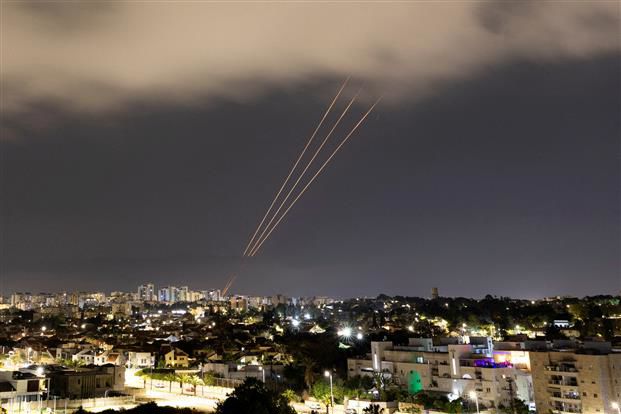Israeli military promises retaliation for strike from Iran as pleas for moderation grow
Fearing an escalation of the Middle East war, international pressure mounted on Israel to exercise patience, as Israelis awaited news on how Prime Minister Benjamin Netanyahu would react to Iran’s first-ever direct strike.

According to a government source, Netanyahu called a meeting of his war cabinet on Monday for the second time in less than twenty-four hours to discuss how to react to Iran’s missile and drone strikes over the weekend.
Israel would react, according to Herzi Halevi, the military chief of staff. He gave no specifics.
He said, “This launch of so many missiles, cruise missiles, and drones into Israeli territory will be met with a response,” at the southern Israeli airbase of Nevatim, which was slightly damaged in the strike on Saturday night.
Many Iranians, who have already experienced economic hardship and stricter social and political regulations after demonstrations in 2022–2023, are terrified of potential Israeli reprisals.
Iran said that it does not want further escalation and conducted the assault in reaction for what it claims was an Israeli airstrike on its embassy complex in Damascus on April 1.
Even though there were no casualties and very little damage was done, the incident raised worries about the spread of violence stemming from the Gaza conflict and raised fears of outright confrontation between the long-standing enemies.
US President Joe Biden informed Israeli Prime Minister Benjamin Netanyahu over the weekend that the US, which had assisted Israel in defusing the Iranian assault, would not take part in an Israeli counterattack.
Clashes between Israel and organizations linked with Iran have broken out in Lebanon, Syria, Yemen, and Iraq since the start of the Gaza War in October. Four Israeli troops were wounded overnight, according to Israel, hundreds of meters inside Lebanese territory.
It seems to be the first reported event of such kind since the start of the Gaza War, despite many gunfights between Israel and Hezbollah, the military organization in Lebanon.
The head of the European Union’s foreign policy, Josep Borrell, told the Spanish radio station Onda Cero, “We’re on the edge of the cliff and we have to move away from it.” “We have to step on the brakes and reverse gear.”
Similar pleas were made by British Foreign Secretary David Cameron, German Chancellor Olaf Scholz, and French President Emmanuel Macron. Antonio Guterres, the secretary-general of the UN, and Washington have also urged moderation.
John Kirby, the White House spokesman for national security, refused to comment on Monday when asked whether Biden asked Netanyahu to be cautious in his response to Iran during their meeting on Saturday night.
“We want to avoid a conflict with Iran. Kirby said during a briefing that “we don’t want to see a regional conflict” and that Israel should choose “whether and how they’ll respond.” “While the United States does not seek escalation, we will continue to defend Israel and U.S. personnel,” U.S. Defense Secretary Lloyd Austin said during a Monday conference call with colleagues in the Middle East and Europe, according to the Pentagon.
Russia has called for moderation but has not openly criticized its ally Iran.
“More escalation serves no one’s interests,” Dmitry Peskov, a spokesperson for the Kremlin, said.
China said that while defending its sovereignty and dignity, it thought Iran could “handle the situation well and spare the region further turmoil”.
According to the official Xinhua news agency on Tuesday, Chinese Foreign Minister Wang Yi informed his Iranian colleague Hossein Amir-Abdollahian over the phone on Monday that China likewise valued Iran’s attention on not attacking neighboring and regional nations.
Following the April 1 death of seven Iranian Revolutionary Guards officers in Damascus, including two senior commanders, Iran launched its offensive. Israel did neither deny or acknowledge that it had carried out the attack.
G7 MULLS SANCTIONS IN IRAN
A 7-year-old child was injured in Iran’s retaliatory strike, which included over 300 missiles and drones and very little damage to Israel. With assistance from the United States, Britain, France, and Jordan, the Iron Dome defense system of Israel shot down the majority of them.
Iran’s intervention was well received in Gaza, where the Israeli onslaught has killed over 33,000 Palestinians, according to estimates from the Gaza Health Ministry.
After the Palestinian terrorist organization struck Israel on October 7, murdering 1,200 people and kidnapping 253 captives, according to Israeli figures, Israel launched its operation against Hamas.
The Group of Seven major democracies, according to British Prime Minister Rishi Sunak, was putting together a concerted package of sanctions against Iran.
“We are united in our condemnation of this attack,” Sunak said in parliament after speaking with the other G7 leaders.
The G7 presidency is now held by Italy, which said it was amenable to fresh penalties and implied that any new actions would target specific people. Antonio Tajani, the foreign minister of Italy, said in a Reuters interview that fresh penalties would need the support of all G7 countries.
At least twelve airlines have canceled or rerouted flights as a result of Iran’s strike, and Europe’s aviation authority has reiterated its recommendation that airlines exercise care while operating between Israeli and Iranian airspace.







